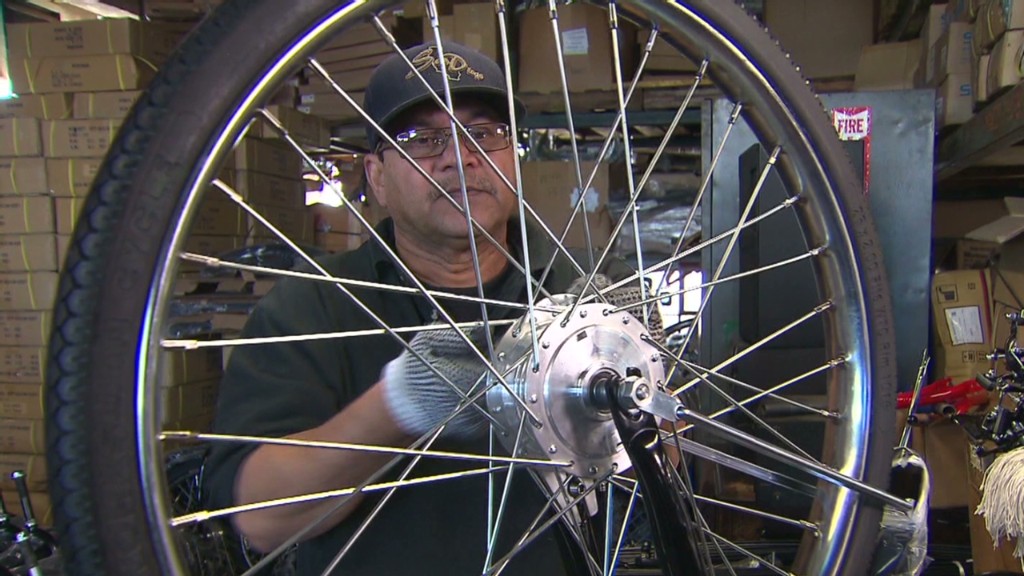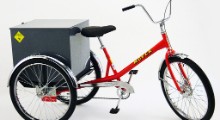
Schwinn and Cannondale are iconic American bicycle brands, but they don't make their bikes in the United States. Trek is another well-known American bike maker, but only a fraction of its bicycles are made in the USA.
Meanwhile, Worksman Industrial Cycles quietly churns out all the bikes that carry its name from a 70-year-old, three-story factory in Queens, N.Y. Worksman has been making bikes in New York since 1898, making it the oldest large-scale bike maker in the U.S. Worksman produces thousands of bicycles a year, but their customers are mostly big businesses rather than weekend riders.
 |
| Move over, golf cart. The Worksman trike makes it easy to cross factory floors. |
Workers at the Queens plant weld metal tubes, paint the frames, build the wheels and assemble all the components. There are sixty employees -- and most live within walking distance.
Many of the company's products are for use in industrial spaces. Trikes with back cargo space are big sellers for maintenance men and security personnel at factories, colleges and warehouses. Boeing (BA) is one of the company's largest customers, as are Ford (F), Wal-Mart (WMT) and General Electric (GE).
The company also makes smaller bikes for deliveries, four-wheeled bikes that are popular in beach towns, and cruisers and commuter bikes for the retail market. On a recent Tuesday, some 50 bikes stood ready for shipment -- an average day's output.
Manufacturing in the United States is costly, said Wayne Sosin, the company's co-owner. But by making the bikes here, they can let customers choose among dozens of styles and configurations, while still maintaining direct oversight of production.
"We can give our customers a lot more service and choice," said Sosin. "We didn't want to say, 'Here's how it comes: It comes in a box. It's blue. That's it.'"
Related: Coolest commutes on two wheels
Worksman was started on Manhattan's Lower East Side by Morris Worksman, a Russian immigrant who owned a dry goods store. All day, he'd watch street merchants struggle with their goods, and he figured there must be a better way. So he invented a bike to transport loads.
For the next several decades, it was popular mostly in New York, said Sosin. During World War II, Worksman's son was an aircraft engineer who traveled to manufacturing plants around the country. He was amazed by their vast size, and immediately saw opportunity.
"If you've ever walked one of these places, they are a million square feet," said Sosin, who owns the company with the founder's granddaughter and her husband. "It's exhausting."
Related: Furniture making comes back to the South
On the factory floor, Worksman's biggest competitor is the golf cart. Sosin said it can be hard to convince managers to switch from battery power to pedals. But they're often won over by the savings. A Worksman trike costs around $1,000, while a golf cart can cost five times that. The bikes also require much less maintenance.
After taking a hit during the recent recession, sales at the company have been solid -- growing by about 8% a year for the last four and a half years, said Sosin, who declined to disclose actual sales figures.
The company has recently started targeting distribution centers, plant nurseries and zoos (they just launched a model that has fat tires for off-road use). They're also targeting consumers through bike shops and their website, with products in the $500 range.
Retro-looking bikes are all the rage among urban dwellers these days, a fact not lost on Sosin.
"A lot of companies are trying to create the illusion that they've been making bikes for 100 years," he said. "They make up a cool story and put a leather seat on it, but it's all made up. Those people that want the genuine article, they find us."
An earlier version of this story incorrectly stated that Trek does not make bicycles in the United States.



